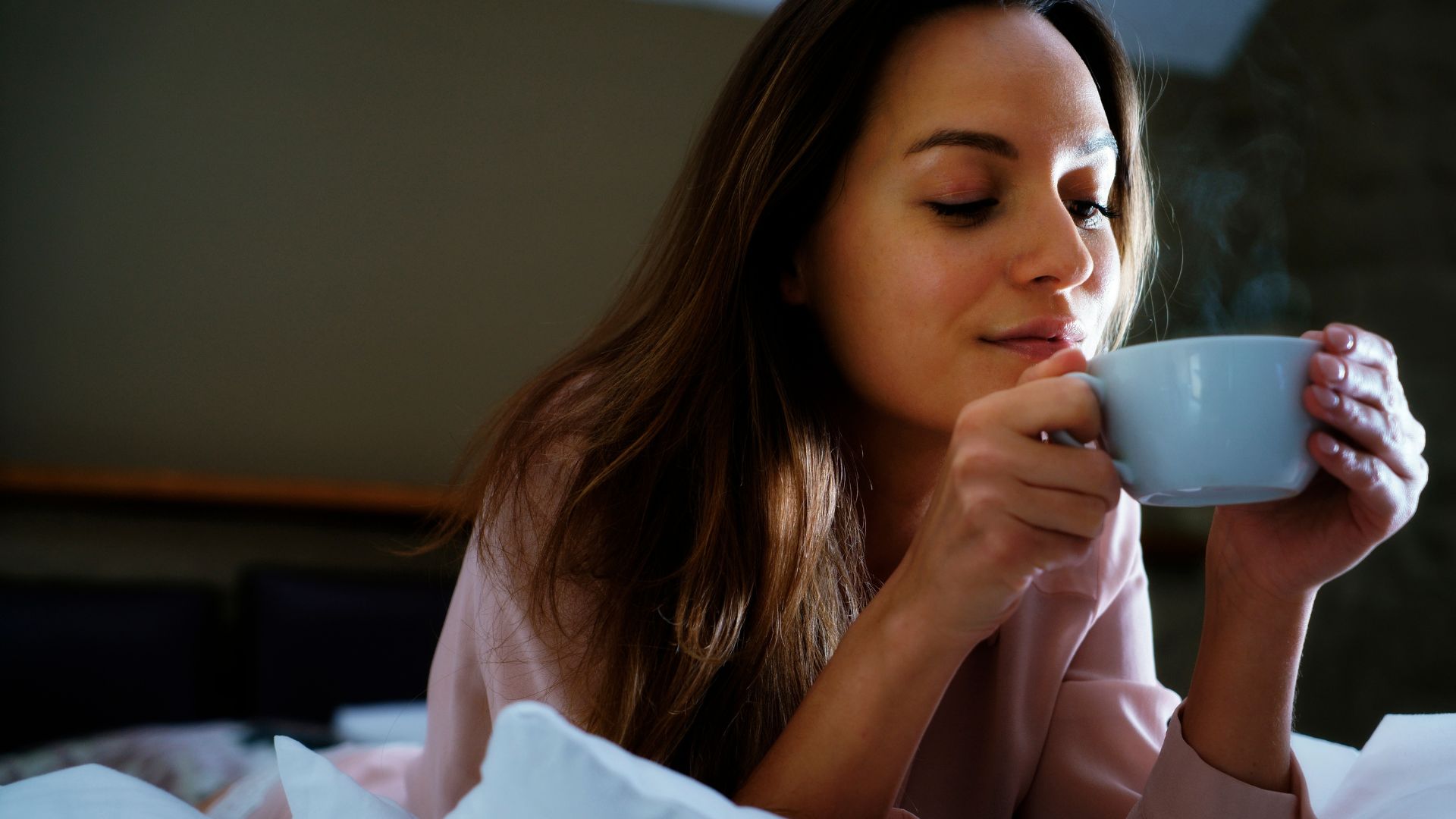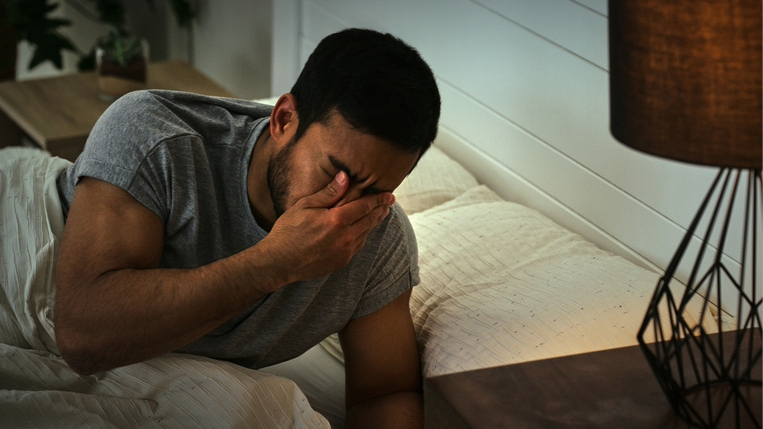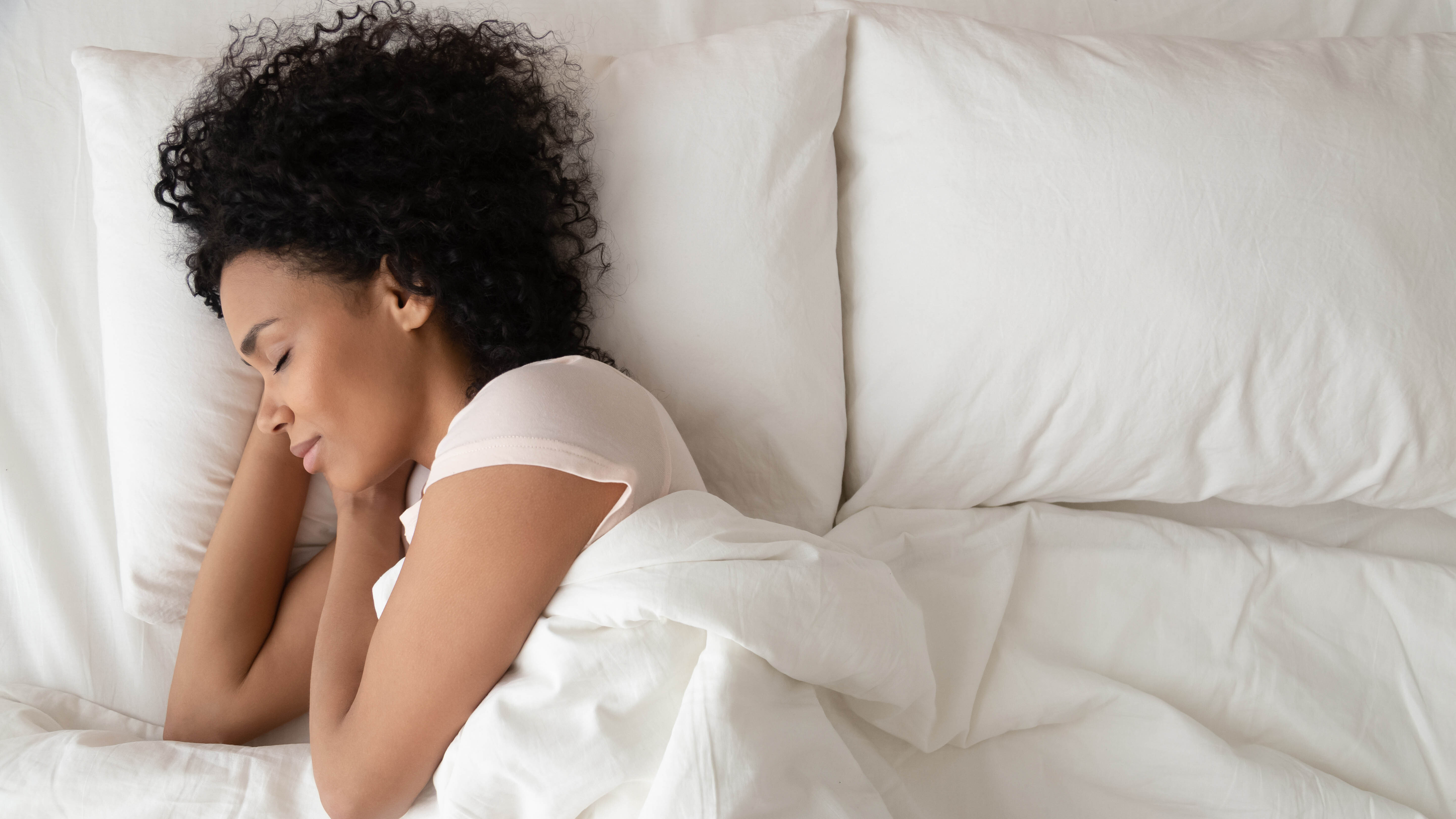Experts reveal how long caffeine stays in your body — and it might be the reason you can't sleep
The lingering affects of caffeine can wreak havoc with your sleep

A cup of coffee can be the perfect pick-me-up, giving you a quick boost of energy on a slow afternoon. But how long does caffeine stay in your system and can it affect you even hours after consumption?
The half life of caffeine is typically around five to six hours but it can be as much as 12 hours, with many factors impacting how long it takes caffeine to leave your system.
This slow clearance means that while the immediate boost of your post-lunch coffee has faded by bed time, the lingering presence of caffeine in your body can still disrupt your sleep.
Understanding how long caffeine lasts in your system can help you regulate your intake. That way you can both indulge in your morning latte and enjoy a good night's sleep.
How long does caffeine last in your system?
The impact of caffeine can typically be felt within 10 minutes of ingesting, although it takes around 45 minutes to an hour for caffeine levels to peak in the bloodstream.
After this peak the effect of caffeine will start to wear off, eventually leaving your system altogether. But it can be a slow process.

“Caffeine takes longer to clear from the body than most people realize,” explains Matt Gallant kinesiologist and sleep supplement formulator. He places the half life of caffeine at around “4-6 hours.”
Get instant access to breaking news, the hottest reviews, great deals and helpful tips.
At this point, roughly half of the caffeine will have cleared from your system. However, the numbers aren't as clear-cut as you might first think.
“If you're a slow caffeine metabolizer or have the ADORA2A genotype, it can take much longer — and even 50 mg of caffeine may disrupt sleep,” advises Gallant.
Factors that impact how long caffeine lasts in your system include:
- Your age
- Your body weight
- How much you’ve eaten
- Certain medications
- Consuming alcohol
- If you smoke
These varying factors make it difficult to understand exactly how long caffeine stays in your body, with estimates for caffeine half-life ranging from two to 12 hours.
Even for those at the lower end of the half-life scale, caffeine will last in your body for many hours after ingestion. This is why an afternoon coffee can disrupt your sleep and why many sleep experts recommend you avoid caffeine for at least eight hours before bed.
The impact of caffeine on the brain and body
Caffeine is a naturally occurring chemical known for its stimulating effect on the brain and central nervous system. It’s considered the “most utilized psychoactive stimulant worldwide.”
“Caffeine has a lot of helpful — and not so helpful — side effects,” says Gallant. “The effects most people seek are the ones that boost energy and improve cognitive function, making it easier to react quickly and stay alert.”

As well as increasing activity in your brain and nervous system, caffeine blocks the impact of sleepy-feeling chemical adenosine. In turn, this makes us feel more awake.
Which is why we reach for a cup of coffee when we’re in an energy slump — but these stimulating effects have their downsides, particularly when going to bed.
Caffeine has a lot of helpful — and not so helpful — side effects
Matt Gallant
“Caffeine can increase cortisol levels and leave you feeling stressed or jittery,” says Gallant.
“It may also cause digestive discomfort, which can often be reduced by avoiding caffeine on an empty stomach.”
Furthermore, research suggests caffeine can limit the amount of deep sleep you get, while its adenosine blocking ability might disrupt your natural sleep wake cycle.
For these reasons, caffeine consumed during the day can contribute to sleep deprivation. The remnants of that energy-boosting side effect means you aren't achieving the high quality rest your body needs.
Common sources of caffeine
Caffeine is a stimulant that both occurs naturally and can be artificially manufactured.
Natural caffeine is found in coffee beans, tea leaves and cacao pods, while manufactured caffeine is used in energy drinks, as well as various medications and foods.
Some common sources of caffeine and their approximate caffeine level per serving include:
| Header Cell - Column 0 | Serving | Approx. caffeine level |
|---|---|---|
Brewed coffee | 8oz | 80-100mg |
Black tea | 8oz | 45-80mg |
Green tea | 8oz | 30-50mg |
Soda | 12oz | 0-50mg |
Energy drink | 12oz | 80-150mg |
Chocolate (60% cacao) | 100g | 40-60mg |
Decaf coffee | 8oz | 3-10mg |
Caffeine can often be found in energy foods and supplements, so if you enjoy exercising in the evening, pay attention to the caffeine content of your pre-workout snack.
Chocolate-flavored sweet treats are another sneaky source of caffeine. While high cacao dark chocolate contains the highest concentration of caffeine, even a scoop of chocolate flavored ice cream can contain low levels of the stimulant.
When should you stop drinking caffeine before bed?
There’s no set time to stop drinking coffee but most experts recommend staying away from caffeine at least eight hours before bed. This includes cutting out other caffeine sources, such as tea, chocolate and energy drinks.

The 10-3-2-1-0 method structures your day for sleep: no caffeine 10 hours before bed, no food 3 hours before, no work 2 hours before, no screen time 1 hour before and 0 times hitting snooze in the morning.
Gallant suggests stopping caffeine intake from 2pm and advises if you're still having trouble sleeping to "try cutting it out altogether."
And followers of the 10-3-2-1-0 sleep method avoid caffeine 10 hours before bed, to give ample time for caffeine to clear from your system.
Post-lunch caffeine can help you avoid the afternoon slump but the side effect is often disrupted sleep and next day fatigue — meaning you'll find yourself reaching for even more coffee.
To increase energy without caffeine, try these tips:
- Stay hydrated: Your body feels weaker when you're lacking fluids so staying hydrated can help maintain your energy levels. Next time you reach for a cup of coffee to help with your dry mouth, try water instead.
- Go for a quick walk: Exercise can increase alertness levels through the release of endorphins, sometimes known as 'runner's high.' Or try a quick pilates routine for energy instead.
- Have a quick nap: Sleep-inducing adenosine is released throughout the day but a power nap can help shake off some fatigue. Keep it to 20 minutes and if you really can't put down the coffee, try a 'nappuccino.'
- Invest in your sleep: Turning your bedroom into a sleep sanctuary can help you enjoy better rest at night and more energy in the day. The bed is the place to start, as the best mattress for your sleep needs can transform your rest, while the best pillow can ensure you're supported.

Some sleep experts suggest there are those who can drink coffee before bed without damaging their sleep — although we suggest you tread carefully with this advice.
While a post-dinner espresso might sound like a nice idea, consider if it’s worth the next-day fatigue.
Caffeine can be a sneaky source of sleep problems, but if you are struggling with long-term sleep deprivation, speak with a healthcare professional

Ruth is an experienced Senior Staff writer at Tom’s Guide, covering all things sleep and mattresses. She writes to help people sleep better, from how-tos to the latest deals to mattress reviews, and has interviewed an array of experts who share her passion. She is also our specialist on memory foam — she’s flown around the world to see memory foam being made — and leads our hotel mattress content. She has a deep interest in the link between sleep and health, and has tried enough mattresses, from Helix to Nectar to Simba, to know the right bed really can make a difference to your wellbeing. Before joining the team at Tom’s Guide, Ruth worked as a sleep and mattress writer for our sister website, TechRadar.
You must confirm your public display name before commenting
Please logout and then login again, you will then be prompted to enter your display name.
 Club Benefits
Club Benefits





